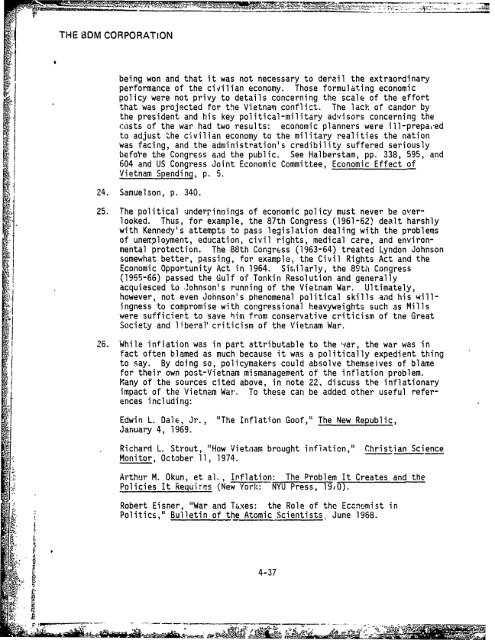policy - The Black Vault
policy - The Black Vault
policy - The Black Vault
Create successful ePaper yourself
Turn your PDF publications into a flip-book with our unique Google optimized e-Paper software.
I<br />
THE 3DM CORPORATION<br />
being won and that it was not necessary to derail the extraordinary<br />
performance of the civilian economy. Those formulating economic<br />
<strong>policy</strong> were not privy to details concerning the scale of the effort<br />
that was projected for the Vietnam conflict. <strong>The</strong> lack of candor by<br />
the president and his key political-military advisors concerning the<br />
costs of the war had two results: economic planners were ill-prepaed<br />
to adjust the civilian economy to the military realities the nation<br />
was facing, and the administration's credibility suffered seriously<br />
before the Congress and the public. See Halberstam, pp. 338, 595, and<br />
604 and US Congress Joint Economic Committee, Economic Effect of<br />
Vietnam Spending, p. 5.<br />
24. Samuelson, p. 340.<br />
25. <strong>The</strong> political underpinnings of economic <strong>policy</strong> must never be overlooked.<br />
Thus, for example, the 87th Congress (1961-62) dealt harshly<br />
with Kennedy's attempts to pass legislation dealing with the problems<br />
of unemployment, education, civil rights, medical care, and environmental<br />
protection. <strong>The</strong> 88th Congress (1963-64) treated Lyndon Johnson<br />
somewhat better, passing, for example, the Civil Rights Act and the<br />
Economic Opportunity Act in 1964. Sinilarly, the 8tith Congress<br />
•, (1965-66) passed the Gulf of Tonkin Resolution and generally<br />
acquiesced to .1ohnson's running of the Vietnam War. Ultimately,<br />
however, not even Johnson's phenomenal political skills and his willingness<br />
to compromise with congressional heavyweights such as Mills<br />
were sufficient to save him from conservative criticism of the Great<br />
Society and liberal' criticism of the Vietnam War.<br />
26. While inflation was in part attributable to the ',ar, the war was in<br />
fact often blamed as much because it was a politically expedient thing<br />
to say. By doing so, <strong>policy</strong>makers could absolve themselves of blame<br />
for their own post-Vietnam mismanagement of the inflation problem.<br />
Many of the sources cited above, in note 22, discuss the inflationary<br />
impact of the Vietnam War. To these can be added other useful references<br />
including:<br />
Edwin L. Dale, Jr.,<br />
January 4, 1969.<br />
"<strong>The</strong> Inflation Goof," <strong>The</strong> New Republic,<br />
Richard L. Strout, "How Vietnam brought inflation," Christian Science<br />
Monitor, October 11, 1974.<br />
Arthur M. Okun, et aL], Inflation: <strong>The</strong> Problem It Creates and the<br />
Policies It Requires (New York: NYU Press, 1910).<br />
Robert Eisner, "War and Taxes: the Role of the Eccnomist in<br />
Politics," Bulletin of the Atomic Scientists, June 1968.<br />
&<br />
S• 4-37<br />
44 v
















